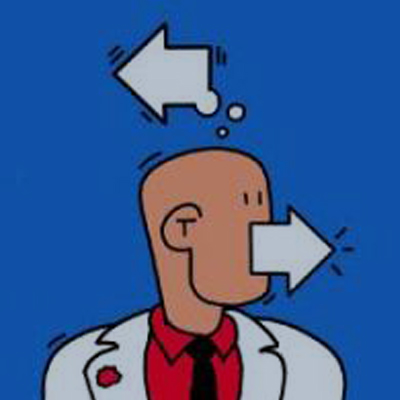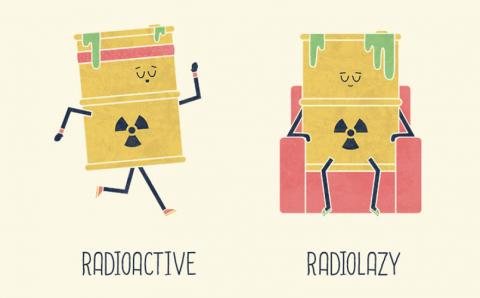
PARADOJA DE LA AMBIGÜEDAD: “Todo es ambiguo; sin embargo, nada es ambiguo.”
Casi todas las palabras, frases e incluso oraciones son ambiguas, si no se ven o escuchan dentro de un contexto más amplio. Sin embargo, el contexto mayor (tanto lingüístico como no lingüístico) resuelve casi todas las ambigüedades—excepto cuando el hablante intenta deliberadamente ser ambiguo, como ocurre con los lingüistas y los políticos. Jacob Mey continúa diciendo que en la vida real no existe tal cosa como la ambigüedad—salvo en ciertas ocasiones bastante especiales, en las que uno intenta engañar a su interlocutor, o “mantener la puerta abierta” a más de una interpretación. Esto sucede cuando tratamos de descifrar una situación social. También ocurre cuando estamos bromeando o tratando de seducir a alguien.
Aquí hay dos ejemplos de ambigüedad sintáctica:
- Flying planes can be dangerous.
(Pilotar aviones puede ser peligroso / Los aviones que vuelan pueden ser peligrosos). - The missionaries are ready to eat.
(Los misioneros están listos para comer / Los misioneros están listos para ser comidos).
Aquí van dos acertijos basados en la ambigüedad y los juegos de palabras:
- ¿Cuándo una puerta deja de ser una puerta?
Cuando está entreabierta (en inglés: ajar, que suena como a jar, “un tarro”). - ¿Cuándo un coche que está en la calle frente a tu casa deja de ser un coche?
Cuando entra a tu entrada de autos (driveway, que suena a “conducir lejos”).
Aquí algunos ejemplos de ambigüedad léxica y juegos de palabras:
- Puedes afinar (tune) un piano, pero no puedes atún (tuna) un pez.
- Escribir con un lápiz roto es inútil (pointless = sin punta/sin sentido).
- Cuando los peces están en escuelas (schools), a veces debaten (debate = debatir/juego de palabras con “debate club”).
- Un ladrón que robó un calendario consiguió doce meses.
- Cuando la niebla se levanta en Los Ángeles, aparece la U.C.L.A.
- Las baterías se repartieron gratuitamente (free of charge = gratis/sin carga eléctrica).
- Un dentista y una manicurista se casaron. Peleaban diente y uña (tooth and nail = ferozmente).
- Con su matrimonio, obtuvo un nuevo apellido (name) y un vestido (a dress).
- Un huevo duro es difícil de batir.
- Cuando has visto un centro comercial (mall), los has visto todos (them all).
- La policía fue llamada a una guardería donde un niño de tres años estaba resistiéndose al descanso (resisting a rest = resistirse a arresto/siesta).
- ¿Oíste del hombre al que le cortaron todo el lado izquierdo? Ahora está bien (all right = todo derecho/bien).
- Una bicicleta no puede sostenerse sola; está demasiado cansada (two tired = dos llantas/demasiado cansada).
- Cuando un reloj tiene hambre retrocede cuatro segundos (four seconds = por segundos/cuatro segundos).
- El tipo que cayó en una máquina de tapicería ahora está totalmente recuperado (fully recovered = completamente cubierto/recuperado).
- Tenía una memoria fotográfica que nunca fue revelada (developed = revelada/desarrollada).
- Cuando vio su primera cana pensó que debía teñirse (dye = morir/teñir).
- La acupuntura es un pinchazo bien hecho. Ese es su punto.
- Aquellos que se agrandan demasiado para sus pantalones quedarán totalmente expuestos al final.
- Un testamento es una señal muerta (dead giveaway = delator inequívoco/testamento tras la muerte).
“La IA puede hacerte reír. ¿Pero puede alguna vez ser verdaderamente humorística?”
por Jyoti Madhusoolanan
👉 https://undark.org/2025/07/21/ai-humor/
“¿Pueden los redactores de ensayos con IA entender la sátira, la ironía o el sarcasmo en los ensayos?”
por Daniel Felix
👉 https://www.yomu.ai/resources/can-ai-essay-writers-understand-satire-irony-or-sarcasm-in-essays
International Society for Humor Studies: http://www.humorstudies.org/
Nilsen, Alleen y Don. The Language of Humor: An Introduction.
Cambridge, Inglaterra: Cambridge University Press, 2019.
👉 www.cambridge.org/core/books/language-of-humor/B37E80D6A21DB3A2E344A4061D996D9C
(This text has been translated into Spanish by Chat GPT)



Ambiguity and Puns
By Don Nilsen
AMBIGUITY PARADOX: “Everything is ambiguous; however, nothing is ambiguous.”
Almost all words, phrases, and even sentences are ambiguous, if they are not seen or heard in the larger context. However, the larger context (both linguistic and non-linguistic) resolves almost all of the ambiguities--Except when the speaker is intentionally trying to be ambiguous, as with linguists and politicians. Jacob Mey goes on to say that in real life, there is no such thing as ambiguity—excepting in certain, rather special occasions, in which one tries to deceive one’s partner, or “keep the door open” to more than one interpretation. This happens when we are trying to figure out a social situation. It also happens when we are teasing or trying to seduce someone.
Here are two examples of syntactic ambiguity:
Flying planes can be dangerous.
The missionaries are ready to eat.
Here are two riddles based on ambituigy and puns:
When is a door not a door any more?
When it's ajar.
When is a car on the road in front of your house not a car any more?
When it turns into your driveway.
Here are some examples of lexical ambiguity and punning:
.. you can tune a piano, but you can't tuna fish,
.. Writing with a broken pencil is pointless.
.. When fish are in schools, they sometimes take debate.
.. A thief who stole a calendar got twelve months.
.. When the smog lifts in Los Angeles U.C.L.A.
.. The batteries were given out free of charge.
.. A dentist and a manicurist married. They fought tooth and nail.
.. With her marriage, she got a new name and a dress.
.. A boiled egg is hard to beat.
.. When you've seen one shopping center you've seen a mall.
.. Police were summoned to a daycare center where a three-year-old was resisting a rest.
.. Did you hear about the fellow whose entire left side was cut off? He's all right now.
.. A bicycle can't stand alone; it's just two tired.
.. When a clock is hungry it goes back four seconds.
.. The guy who fell onto an upholstery machin is now fully recovered.
.. He had a photographic memory which was never developed.
.. When she saw her first strands of gray hair she thought she'd dye.
.. Acupuncture is a jab well done. That's the point of it.
.. Those who get too big for their pants will be totally exposed in the end.
.. A will is a dead giveaway.
“AI can make you laugh. But can it ever be truly humorous?”
by Jyoti Madhusoolanan”
https://undark.org/2025/07/21/ai-humor/
“Can AI essay writers understand satire, irony, or sarcasm in essays?”
by Daniel Felix
https://www.yomu.ai/resources/can-ai-essay-writers-understand-satire-irony-or-sarcasm-in-essays
International Society for Humor Studies: http://www.humorstudies.org/
Nilsen, Alleen and Don. The Language of Humor: An Introduction.
Cambridge, England: Cambridge University Press, 2019.
www.cambridge.org/core/books/language-of-humor/B37E80D6A21DB3A2E344A4061D996D9C
